-
Countries
-
Data and Analysis
-
Special Focus
-
Crisis Responses
May 24 2022
Print
Reporting directly
DTM Country Coordinator
Duty Station
Warsaw, Poland
Number of positions
1
Starting Date
As soon as possible
Type
Professional Staff, Grade UG
Closing Date
2022-05-31
Status
Open
I. ORGANIZATIONAL CONTEXT AND SCOPE
Established in 1951, IOM is the leading inter-governmental organization in the field of migration and works closely with governmental, intergovernmental and non-governmental partners. The International Organization for Migration (IOM) is committed to the principle that humane and orderly migration benefits migrants and society. As the leading international organization for migration, IOM acts with its partners in the international community to: assist in meeting the growing operational challenges of migration management; advance understanding of migration issues; encourage social and economic development through migration, and; uphold the human dignity and well-being of migrants.
IOM has been active in Poland since 2002 under an agreement with the Polish government and conducts various migration programs, including activities supporting the integration of male and female migrants into Polish society. IOM in Poland implements projects aimed at the private sector to promote ethical recruitment, respect for the rights of migrants and migrant women as well as the elimination of forced labour from value chains and the prevention of human trafficking.
Following the launch of military operations across Ukrainian territory on 24 February 2022, substantive flows and displacements across Ukraine and toward neighbouring countries have been reported countries in the following days. While air travel has been suspended in Ukraine and Moldova, Ukraine shares land border with four European Union (EU) Member States: Poland, Romania, Hungary and Slovakia. Other non-EU countries (3) which share their border with Ukraine include Republic of Moldova, Russian Federation and Belarus. Large in and out flows to and through Moldova of Ukrainian and Third Country nationals created the need to set up a monitoring system and analyse the trends and patterns of mobility.
Under the direct supervision of the DTM Country Coordinator, the DTM Reporting Coordinator is responsible for analysing and developing information products from DTM activities.
II. RESPONSIBILITIES AND ACCOUNTABILITIES
- Analyze the collected data on arrivals, exits and presence of Ukrainian and third country nationals to, from and in Poland.
- Produce reports and other information outputs (eg. infographics, maps, charts and graphs) based on the collected data, including, analysis of the displacement patterns, needs and intentions of displaced population.
- Analyze collected data and available information from the perspective of IOM and national counterparts to identify data gaps and propose approaches and mechanisms to address those needs.
- Support development of data collection methodologies, tools (eg. survey design) and processes as well as develop guidelines and standard operating procedures for data enumerators.
- Train the data collectors on the specific questionnaire to ensure harmonized understanding of the formulated questions and options and ensure compatibility of the collected data.
- Ensure that the developed reports and info/products are in line with the Global DTM Analytical, Knowledge and Output (AKO) unit to ensure all outputs are aligned with global DTM Standards
- Liaise with relevant authorities, UN agencies, NGOs, think tanks, government authorities, and other stakeholders on issues relevant to the programme. Represent IOM at relevant meetings.
- Support the IM Officer in ensuring the dissemination and adaption as necessary of information management tools that meet partners’ and other humanitarian actors’ needs.
- Support and represent the role and functions of the DTM programme within cluster/sectoral activities.
- Ensure adherence to IOM data protection principles in regard to collection, use, storage, disclosure and disposal of personal data.
- Perform such other duties as may be assigned.
III. REQUIRED QUALIFICATIONS AND EXPERIENCE
EDUCATION
- Master’s degree in Business Administration, International Relations, Political Science, Communications, Information Management, Computer Science or a related field from an accredited academic institution with two years of relevant professional experience; or
- University degree in the above fields with four years of relevant professional experience.
EXPERIENCE AND SKILLS
- Experience working in international organizations and the humanitarian community;
- Experience in the development and implementation of population databases a distinct advantage;
- Experience in relevant issues such as migration, displacement, and humanitarian assistance would be an asset.
- Statistical analysis (STATA, SPSS, etc);
- Experience working in graphic softwares (e.g. Microsoft PowerBi, Adobe Illustrator, Adobe InDesign)
- Data collection, research, and report writing;
- Writing technical requirements documents, translating/planning specifications to technical briefs for data capture/analysis, and compiling diverse datasets;
- Strong computer background, including experience with relational databases, Microsoft applications, spreadsheets, and word processing.
IV. LANGUAGES
Fluency in English (written and oral) is required. Polish and Ukrainian proficiency is advantage.
V. COMPETENCIES
IOM’s competency framework can be found at this link.
Values
- Inclusion and respect for diversity: respects and promotes individual and cultural differences; encourages diversity and inclusion wherever possible.
- Integrity and transparency: maintains high ethical standards and acts in a manner consistent with organizational principles/rules and standards of conduct.
- Professionalism: demonstrates ability to work in a composed, competent and committed manner and exercises careful judgment in meeting day-to-day challenges.
Core Competencies – behavioural indicators
- Teamwork: develops and promotes effective collaboration within and across units to achieve shared goals and optimize results.
- Delivering results: produces and delivers quality results in a service-oriented and timely manner; is action oriented and committed to achieving agreed outcomes.
- Managing and sharing knowledge: continuously seeks to learn, share knowledge and innovate.
- Accountability: takes ownership for achieving the Organization’s priorities and assumes responsibility for own action and delegated work.
- Communication: encourages and contributes to clear and open communication; explains complex matters in an informative, inspiring and motivational way.
Managerial Competencies – behavioral indicators
- Leadership: provides a clear sense of direction, leads by example and demonstrates the ability to carry out the organization’s vision; assists others to realize and develop their potential.
- Empowering others & building trust: creates an atmosphere of trust and an enabling environment where staff can contribute their best and develop their potential.
- Strategic thinking and vision: works strategically to realize the Organization’s goals and communicates a clear strategic direction.
Other:
IOM is committed to a diverse and inclusive environment.
This post is subject to local recruitment. Only those holding a valid residence and work permit for Poland will be eligible for consideration.
Any offer made to the candidate in relation to this vacancy notice is subject to funding confirmation.
At the time of recruitment, all candidates must disclose any known relative or spouse who works for IOM. Candidates may also be requested to provide documentary evidence of academic degree(s), professional licenses, and proof of no criminal records as relevant to the requirements of the position advertised.
Appointment will be subject to certification that the candidate is medically fit for appointment, verification of residency, visa, and authorizations by the concerned Government, where applicable.
Vaccination against COVID-19 will be required for IOM personnel who are hired or otherwise engaged by IOM. As part of the mandatory medical entry on duty clearance, candidates will be requested to provide evidence of full vaccination.
HOW TO APPLY
Interested candidates are invited to submit their application including a CV and a completed Personal History Form in English by email to: IOMPolandHR@iom.int , specifying the vacancy reference number PLCFA22-054 and full name in the subject line.
Please click this link to access the Personal History Form (two pages).
NOTE: Due to the volume of applications received, IOM Poland will not be able to respond to all inquiries about the application status and will only contact shortlisted candidates.
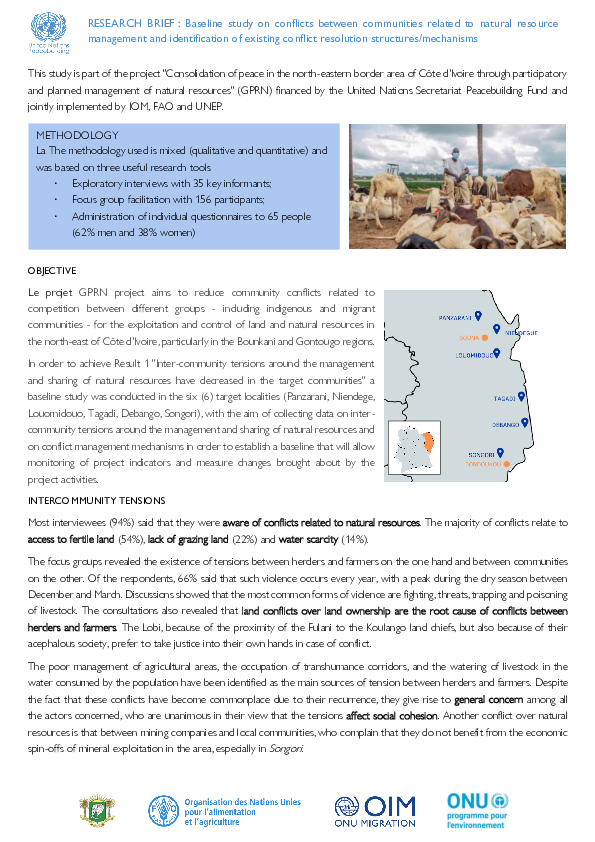
Contact
Aude Nanquette, Ananquette@iom.int
Language
English
Location
Côte d’Ivoire
Period Covered
Apr 24 2022
May 12 2022
Activity
- Other
- Survey
- Community Perception
A baseline study was conducted in the six (6) target localities (Panzarani, Niendege, Louomidouo, Tagadi, Debango, Songori), with the aim of collecting data on inter-community tensions around the management and sharing of natural resources and on conflict management mechanisms, so as to reduce community conflicts related to competition between different groups - including indigenous and migrant communities - for the exploitation and control of land and natural resources in the north-east of Côte d'Ivoire, particularly in the Bounkani and Gontougo regions.
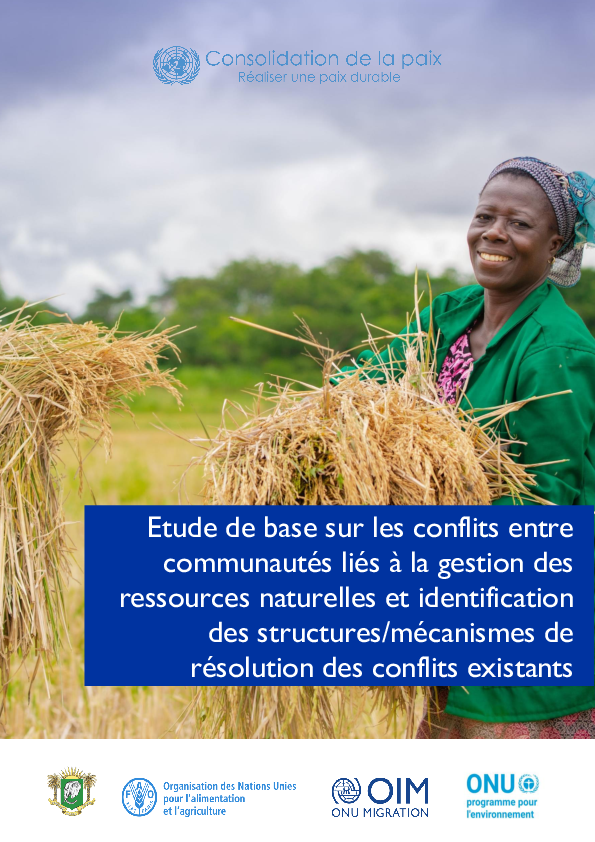
Contact
Aude Nanquette, Ananquette@iom.int
Language
French
Location
Côte d’Ivoire
Period Covered
Apr 24 2022
May 12 2022
Activity
- Other
- Survey
- Community Perception
Une étude de base a été mené du 24 avril au 12 Mai 2012 dans les six (6) localités cibles, dans le but d’avoir une compréhension plus approfondie du niveau de cohésion sociale et des mécanismes de gestion des conflits dans les localités afin de favoriser le dialogue ; l’élaboration de plans participatifs de gestion du territoire et leur suivi ; le renforcement des compétences des autorités étatiques locales en matière de résolution de conflits liés à la gestion et au partage des ressources naturelles dans les régions du Gontougo et du Boukani.
Flow Monitoring is a component of DTM and it is used to track population movements inside a country, within a region or across regions.
The dataset includes: - monthly and daily figures on arrivals by sea and by land to Europe (Bulgaria, Cyprus, Greece, Italy, Malta, Spain) - monthly and daily figures on transits along the Western Balkan region (Albania, Bosnia and Herzegovina, Croatia, Montenegro, North Macedonia, Romania, Slovenia, Serbia, Kosovo*) - figures on reported country of origin of arrivals and transits - figures on reported migrant presence in reception centers.
Population Groups
Survey Methodology
Unit of Analysis Or Observation
Type of Survey or Assessment
Keywords

Contact
DTMcovid19@iom.int
Language
English
Location
Global
Period Covered
May 16 2022
May 23 2022
Activity
- Other
The DTM Global Mobility Restrictions Overview provides updates on international air travel restrictions and conditions for authorized entry. This overview aims to understand how COVID-19 has impacted human mobility, detailing how global and regional trends in air travel measures have evolved since COVID-19 was declared a global pandemic in March 2020. The data presented focuses on the changes in public health-related immigration and border management measures. It provides information intended to support IOM missions and partners in targeted response planning and advocacy for vulnerable populations who may be affected by changes in global mobility.

Contact
DTMcovid19@iom.int
Language
English
Location
Global
Period Covered
May 09 2022
May 16 2022
Activity
- Other
The DTM Global Mobility Restrictions Overview provides updates on international air travel restrictions and conditions for authorized entry. This overview aims to understand how COVID-19 has impacted human mobility, detailing how global and regional trends in air travel measures have evolved since COVID-19 was declared a global pandemic in March 2020. The data presented focuses on the changes in public health-related immigration and border management measures. It provides information intended to support IOM missions and partners in targeted response planning and advocacy for vulnerable populations who may be affected by changes in global mobility.
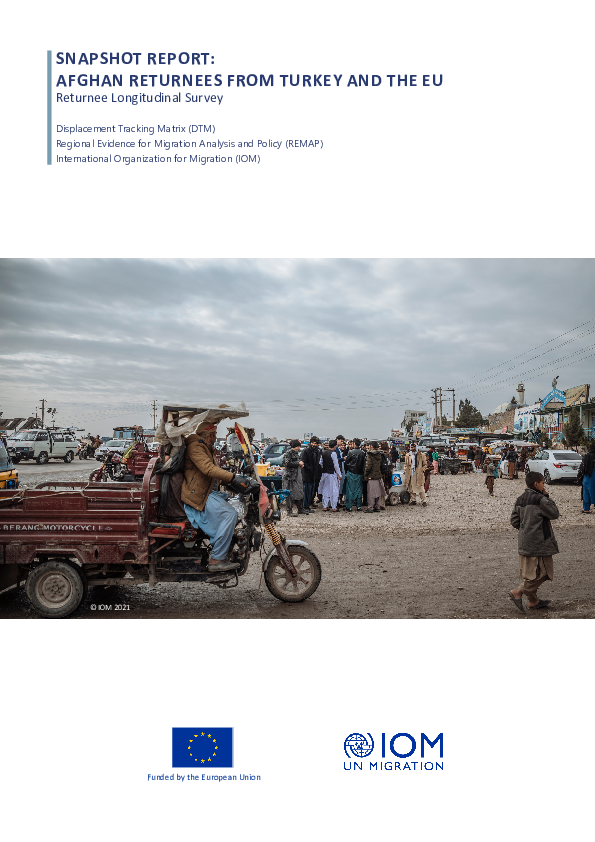
Contact
DTMAfghanistan@iom.int
Language
English
Location
Afghanistan
Period Covered
May 01 2021
Aug 31 2021
Activity
- Survey
- Return Intention
This report is the result of the first round of data collection that took place from May to August 2021 with Afghan migrants who returned from Turkey and the EU in 2018, 2019, 2020 and 2021 through IOM’s Assisted Voluntary Return and Reintegration (AVRR) and Stabilisation, Reintegration and Resilience (SRR) programmes. During the data collection period, 998 respondents were interviewed in person or over the phone across 102 districts in 17 provinces.
This report is divided into three main sections. The first section summarises the key findings in this report. The second section starts with a description of the methodology and includes the research method, sampling information and limitations. The third section presents the analysis of the data that was collected between May and August 2021. The analysis chapter is further subdivided into eight thematic sections. The first subsection covers the demographics and socio-economic profiles of the return migrants. This is followed by a subsection on the employment situation, occupational sector and income and debt status of the returnees (prior to migration; in Turkey or the EU and in Round 1, which took place from May to August 2021). The third subsection explores the reasons for migration. The fourth subsection examines the migration journey, including the reasons for migrating to Turkey or the EU. The following subsection dives deeper into the reasons for return and then an additional subsection goes into the challenges that returnees experience after returning to Afghanistan. Finally, the last two subsections examine prior migration experiences and re-migration intentions.
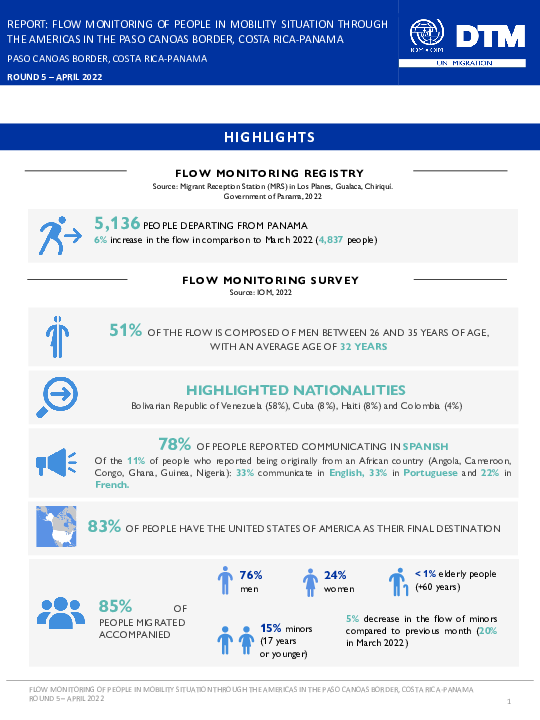
Contact
Angelica Madrigal amadrigal@iom.int
Language
English
Location
Costa Rica
Period Covered
Apr 01 2022
Apr 30 2022
Activity
- Flow Monitoring Survey
- Flow Monitoring
- Mobility Tracking
- Baseline Assessment
In the framework of the COVID-19 emergency, since March 19, 2020, the Government of Costa Rica has kept its land border with Panama closed for the Controlled Flow Binational Operation, which sought an orderly and safe migration of migrants moving through the Americas.
From August 2021 to March 2022, the Government of Panama reports the entry into Panama of 102,122 migrants: Haiti (56%), Cuba (11%), Brazil (7%), Bolivarian Republic of Venezuela (6%), Chile (6%) among other countries in South America, Africa and Asia (13%).
In Costa Rica, during 2022, a steady increase in the number of migrants of this migration flow has been identified (as of April 2022 it has increased by 30% compared to December 2021, when the monitoring of flows in Costa Rica began). According to data from the General Directorate of Migration and Aliens (DGME), during May 2021 and February 2022, 5,426 rejections were reported in Paso Canoas.
In Costa Rica, many vulnerabilities are perceived: pregnant women, children under five years of age, emotional exhaustion caused by stress, anguish and frustration. In addition, the main needs detected are associated with access to food, shelter, medical assistance and safety during their migration journey.
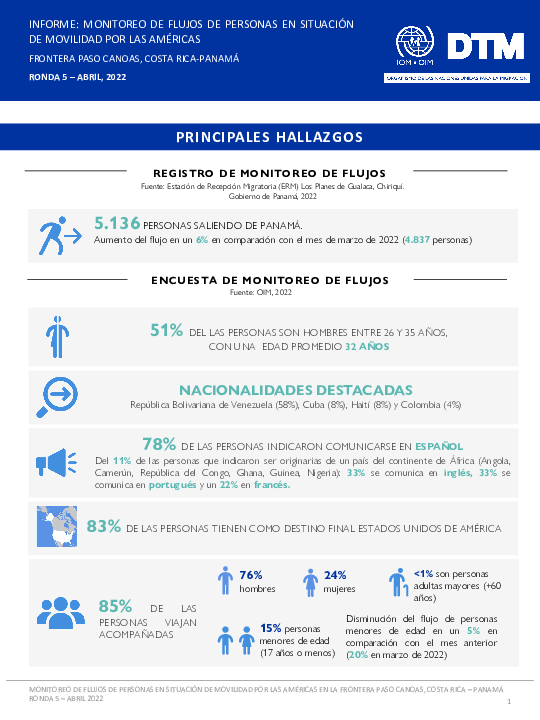
Contact
Angelica Madrigal amadrigal@iom.int
Language
Spanish
Location
Costa Rica
Period Covered
Apr 01 2022
Apr 30 2022
Activity
- Flow Monitoring Survey
- Flow Monitoring
- Mobility Tracking
- Baseline Assessment
En el marco de la emergencia por la COVID-19, desde el 19 de marzo del 2020, el Gobierno de Costa Rica mantiene cerrada su frontera terrestre con Panamá para la Operación Binacional Flujo Controlado, la cual procuraba una migración ordenada y segura de personas migrantes en situación de movilidad por América.
Desde agosto de 2021 hasta marzo de 2022, el Gobierno de Panamá reporta el ingreso a Panamá de 102.122 personas migrantes: Haití (56%), Cuba (11%), Brasil (7%), República Bolivariana de Venezuela (6%), Chile (6%), entre otros países del Sur de América, África y Asia (13%).
En Costa Rica, durante el 2022, se ha identificado un aumento constante en la cantidad de personas migrantes de este flujo migratorio (a abril de 2022 ha aumentado en un 30% en comparación con diciembre, 2021, cuando inició el monitoreo de flujos en Costa Rica). Además, de acuerdo con datos de la Dirección General de Migración y Extranjería (DGME), durante mayo de 2021 y febrero de 2022 se han realizaron 5.426 rechazos en Paso Canoas.
En Costa Rica se perciben muchas vulnerabilidades: mujeres embarazadas, niños y niñas menores de cinco años, desgaste emocional ocasionado por estrés, angustia y frustración. Además, las principales necesidades detectadas se asocian con el acceso a alimento, alojamiento, asistencia médica y seguridad en su trayecto.

Contact
DTM Mali, DTMMali@iom.int
Language
French
Location
Mali
Period Covered
Jan 01 2022
Mar 31 2022
Activity
- Survey
- Flow Monitoring Survey
- Flow Monitoring
Le rapport présente les principaux résultats des enquêtes individuelles effectuées par la DTM auprès de migrants transitant par les points de suivi de flux (FMP) du Mali au cours du premier trimestre de l’année 2022.
Les résultats des enquêtes FMS réalisées témoignent du fait que le Mali soit l’une des principales routes empruntées par les migrants en Afrique de l’Ouest. En effet, la diversité des nationalités observées (18 nationalités), des routes empruntées, des pays de provenance et de destination, démontrent la place prépondérante qu’occupe le Mali dans les mobilités en Afrique de l’Ouest et du Centre.
Il ressort par ailleurs de ces analyses que les migrants sont majoritairement des hommes célibataires, des jeunes âgés entre 20 et 30 ans voyageant principalement pour des raisons économiques. Spécifiquement, ils sont à la recherche d’opportunités de travail soit à l’intérieur de la région, soit en Afrique du Nord ou espérant rejoindre l’Europe.
